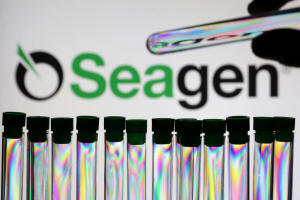Seagen's breast cancer therapy succeeds in late-stage study
 Send a link to a friend
Send a link to a friend
 [August 17, 2023]
(Reuters) -Seagen said on Wednesday that a combination of its
therapy, Tukysa, met the main goal of a late-stage study in some breast
cancer patients, boosting the prospects of the company that is in the
process of being acquired by Pfizer Inc. [August 17, 2023]
(Reuters) -Seagen said on Wednesday that a combination of its
therapy, Tukysa, met the main goal of a late-stage study in some breast
cancer patients, boosting the prospects of the company that is in the
process of being acquired by Pfizer Inc.
Pfizer in March agreed to acquire Seagen and its targeted therapies in a
$43 billion deal to help the drugmaker brace for a steep fall in
COVID-19 product sales and generic competition for some top-selling
drugs.
Tuksya, along with Roche's Kadcyla, helped extend the time that patients
with a type of breast cancer lived without their disease worsening.
Kadcyla belongs to a class of drugs called antibody-drug conjugates
(ADC), which have been described as "guided-missile" cancer drugs and
the use of these drugs for breast cancer patients has grown in the past
few years.
The Roche drug faces competition from Daiichi Sankyo’s and AstraZeneca's
<AZN.L> Enhertu.
Tukysa, chemically known as tucatinib, is already approved in
combination with Roche’s Herceptin and chemotherapy Xeloda in patients
whose cancer has worsened or spread despite at least one prior round of
treatment.
[to top of second column]
|

Seagen logo and test tubes are seen in
this illustration taken June 27, 2022. REUTERS/Dado Ruvic/Illustration/File
Photo
 In the current trial, the drug was
being tested in patients with a type of breast cancer known as HER2
positive, which accounts for 15% to 20% of all breast cancers in the
United States.
HER2 protein contributes to the growth and spread of breast cancer.
Breast cancer is the second-most common cancer among women in the
United States, according to government data.
(Reporting by Mariam Sunny in Bengaluru; Editing by Maju Samuel)
[© 2023 Thomson Reuters. All rights
reserved.]This material may not be published,
broadcast, rewritten or redistributed.
Thompson Reuters is solely responsible for this content. |